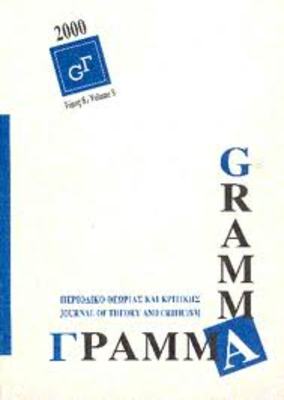Crisis, Ruptures and the Rapture of an Imperceptible Aesthetics : A Recent History of the Hellenic Festival
Part of : Γράμμα : περιοδικό θεωρίας και κριτικής ; Vol.22, No.2, 2014, pages 109-120
Issue:
Pages:
109-120
Abstract:
The focus of this article lies on the recent history of the Hellenic Festival, discussing the so-called new phase after 2006, when Giorgos Loukos took over as artistic director. While the Festival claimed an international profile promoting collaborations with major European festivals and theatre companies, its policies had to go through restructuring due to the raging economic crisis. The years from 2010 to the present marked a rupture with previous discourses and politics, turning the Festival into a topos of transformation and fluidity which seems to elude certain conditions of production and reception pertaining to its past history. The article presents an inquiry into the official policies as much as the artistic practices which constitute this topos, while also mapping out the emergent trends which produce its particular dynamic
Subject:
Subject (LC):
References (1):
- Banu, Georges, and Bruno Tackels, eds. Le Cas Avignon 2005: Regards Critiques. Vicla Gardiole: L'Entretemps, 2005. Print.Bastias, Kostis. "Introductory Treatise and Dramaturgical Draft." [«Εισηγητική έκθεσις και σχέδιον δραματολογίου».] 1936. Print.Fischer-Lichte, Erika. "Between Text and Cultural Performance: Staging Greek Tragedies in Germany." Theatre Survey 40.1 (1990): 1-29. Print.—. "The History of the Discipline." Theatre and Performance Studies. London: Routledge, 2014. 12-7. Print.—. Dionysus Resurrected: Euripides ' The Bacchae in a Globalizing World. Oxford: Wiley-Blackwell, 2014. Print.—. The Transformative Power of Performance: A New Aesthetics. London: Routledge, 2008. Print.Georgousopoulos, Kostas. "Listed Texts." [«Κείμενα διατηρητέα».] Ta Nea 11 Dec. 2004, Vivliodromio sec. Print.Hamilakis, Yiannis. The Nation and its Ruins: Antiquity, Archeology and National Imagination in Greece. Oxford: Oxford UP, 2007. Print.Ioannidou, Eleftheria, "The Persians without Empathy." Engramma: La Tradizione Classica nella Memoria Occidentale. ll\h ed. Universita IUAV di Venezia, 1 Feb. ,2010 Web. 20 July 2014. <http://www.engramma.it/eOS/index.php7id_articolo=394>.—. "Toward a National Heterotopia: Ancient Theatres and the Cultural Politics of Performing Ancient Drama in Modern Greece." Comparative Drama. 44/45 (2010/2011): 385-403. Print.Karali, Antigoni. "Young Generation Wins the Bet." [«Κέρδισε το στοίχημα η Νέα Γενιά».] Ethnos.gr. Ethnos 8 July 2014. Web. 20 July 2014. <http://www.ethnos.gr/article.asp?catid=23610&subid=2&pubid=64033133>.Leontis, Artemis. Topographies of Hellenism: Mapping the Homeland. Ithaca: Cornell UP, 1995. Print.Lorey, Isabell. Die Regierung der Prekären. Wien: Turia and Kant, 2012. Print.Loukos, Giorgos. "Anti-Glamour Culture." [«Ο πολιτισμός του αντί-γκλάμουρ».] Interview by Stavros Dioskouridis. LIFO, 4 Apr. 2013. Web. 20 July 2014. http://www.LIFO.gr/mag/features/3152>.—. "Giorgos Loukos talks to LIFO about Everyone and Everything." [«Ο Γιώργος Λούκος μιλάει στη LIFO για όλους και για όλα».] Interview by Thodoris Dimitropoulos. LIFO. 341 ed, 25 May 2013. Web. 20 July 2014. <http://www.LIFO.gr/mag/features/3812>.Müller, Heiner. Rotwelsch. Berlin: Merve Verlag, 1982. Print.Papadopoulos, Dimitris, Niamh Stephenson, and Vassilis Tsianos. Escape Routes: Control and Subversion in the Twenty-First Century). London: Pluto Press, 2008. Print.Primavesi, Patrick. "Tragödie-, Fragment und Theater." Theater des Fragments. Performative Strategien im Theater zwischen Antike und Postmoderne. Ed. Anton Bierl, Gerald Siegmund, Christoph Meneghetti, and Clemens Schuster. Bielefeld: Transcript, 2009. 147-64. Print.Rokem, Freddie. Performing History: Theatrical Representations of the Past in Contemporary Theatre. Iowa City: U of Iowa P, 2000. Print.Siegmund, Gerald. "Die Kunst des Erinnerns. Fiktion als Verführung zur Realität." Rimini Protokoll. Experten des Alltags. Das Theater von Rimini Protokoll. Ed. Miriam Dreysse and Florian Malzacher. Berlin: Alexander Verlag, 2007. 182-205.Print.Siouzouli, Natascha. "Sakralität und Sakralisierung im Kontext Europäischer Theater Festivals." Staging Festivity: Theater und Fest in Europa. Ed. Erika Fischer-Lichte and Matthias Warstat. Tübingen: Narr/ Francke, 2009. 89-101. Print.—. "Un/familiar Landscapes: Tragedies and Festivals." The Politics of Interweaving Performance Cultures: Beyond Postcolonialism. Ed. Erika Fischer-Lichte, et al.York: Routledge, 2014. 138-55. Print.—. "The Tradition of the Epidaurus Festival: The Affinities with the Festivals of Bayreuth and Salzburg." [«Η παράδοση του Φεστιβάλ Επιδαύρου: Οι συγγένειες με τα Φεστιβάλ του Μπαϊρόιτ και του Σάλτσμπουργκ».] Tradition and Innovation in Modern Greek Theatre. [Παράδοση και εκσυγχρονισμός στο νεοελληνικό θέατρο: από τις απαρχές ως τη μεταπολεμική εποχή.] Ed. Konstantina Georgiadi and Antonis Glytzouris. Rethymno: Penepistimiakes ekdosis Kritis, 2010. 449-55. Print.Tzevelekou, Vassiliki. "Loukos Stays, Georgousopoulos Gets Wedged in." [«Ο Λούκος παραμένει, με σφήνα τον Γεωργουσόπουλο».] Eßmerida ton Syntakton, 24 January 2013. Web. 20 July 2014. <http://www.efsyn.gr/?p=18142>.Veltsos, Giorgos. "Athens and Epidaurus Festival 11 Atheneans." [Φεστιβάλ Αθηνών και Επιδαύρου, 11 Αθηναίοι."] LIFO 111, Special Issue on the Hellenic Festival, 15 May 2008. Web. 20 July 2014. http://www.LIFO.gr/mag/features/614>.Warstat, Matthias. "Feste." Metzler Lexikon Theatertheorie. Ed. Erika Fischer-Lichte, Doris Kolesch, and Matthias Warstat. Stuttgart: Metzler, 2005. 101-04. Print.




